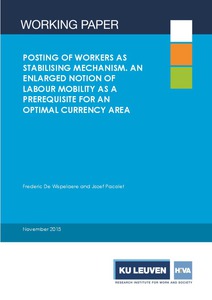Posting of workers as stabilising mechanism. An enlarged notion of labour mobility as a prerequisite for an optimal currency area
"Several reasons favour increased ‘temporary’ intra-EU labour mobility through posting of workers rather than a more ‘permanent’ kind of intra-EU labour mobility through migration of EU-workers and self-employed persons, as a prerequisite for an optimum currency area or as a stabilisation tool...
| Main Authors: | , |
|---|---|
| Institution: | ETUI-European Trade Union Institute |
| Format: | TEXT |
| Language: | English |
| Published: |
Leuven
2015
HIVA |
| Subjects: | |
| Online Access: | https://www.labourline.org/KENTIKA-19107442124919256249-Posting-of-workers-as-stabilis.htm |
| _version_ | 1771659902874288131 |
|---|---|
| author | De Wispelaere, Frederic Pacolet, Jozef |
| author_facet | De Wispelaere, Frederic Pacolet, Jozef |
| collection | Library items |
| description | "Several reasons favour increased ‘temporary’ intra-EU labour mobility through posting of workers rather than a more ‘permanent’ kind of intra-EU labour mobility through migration of EU-workers and self-employed persons, as a prerequisite for an optimum currency area or as a stabilisation tool to support adjustment to asymmetric shocks. Moreover, other criteria to realise an optimum currency area and to stabilise asymmetric shocks, in particular through fiscal transfers and wage flexibility, could be fulfilled by the posting of workers as well. This posting mechanism, which involves workers being temporarily employed in a Member State other than their Member State of origin but still being taxed in their Member State of origin, is therefore a useful stabilisation tool in case the Member State of origin is confronted with an asymmetric shock. The impact of the stabilisation effect of posting workers will be determined by several aspects: the number of posted workers, the wage earned in the Member State of temporary employment and finally the period of posting. This stabilisation effect was calculated for Greece. If some 10% of the current unemployed population living in Greece would be posted for a period of 6 months or longer, yearly approximately € 1 billion labour tax revenues would be collected by Greece, which is equal to roughly 4% of their total labour tax revenues. We recommend on this basis that Greece could encourage the use of posting of workers as potential stabilisation tool." |
| format | TEXT |
| geographic | EU countries |
| id | 19107442124919256249_76311702a6514beb94780c1fa3fac22c |
| institution | ETUI-European Trade Union Institute |
| is_hierarchy_id | 19107442124919256249_76311702a6514beb94780c1fa3fac22c |
| is_hierarchy_title | Posting of workers as stabilising mechanism. An enlarged notion of labour mobility as a prerequisite for an optimal currency area |
| language | English |
| physical | 23 p. Digital |
| publishDate | 2015 |
| publisher | Leuven HIVA |
| spellingShingle | De Wispelaere, Frederic Pacolet, Jozef currency labour mobility migration posted worker self employed temporary employment Posting of workers as stabilising mechanism. An enlarged notion of labour mobility as a prerequisite for an optimal currency area |
| thumbnail | https://www.labourline.org/Image_prev.jpg?Archive=107207992548 |
| title | Posting of workers as stabilising mechanism. An enlarged notion of labour mobility as a prerequisite for an optimal currency area |
| topic | currency labour mobility migration posted worker self employed temporary employment |
| url | https://www.labourline.org/KENTIKA-19107442124919256249-Posting-of-workers-as-stabilis.htm |

